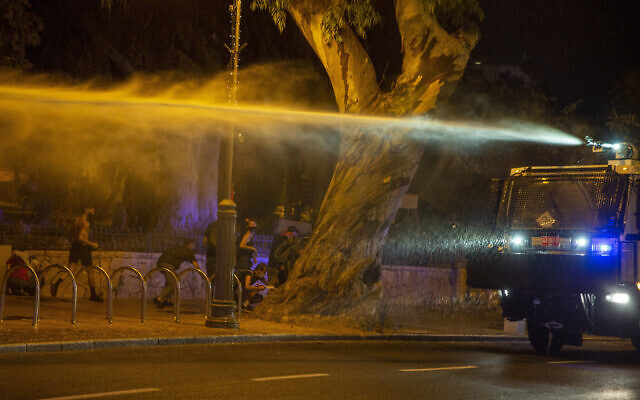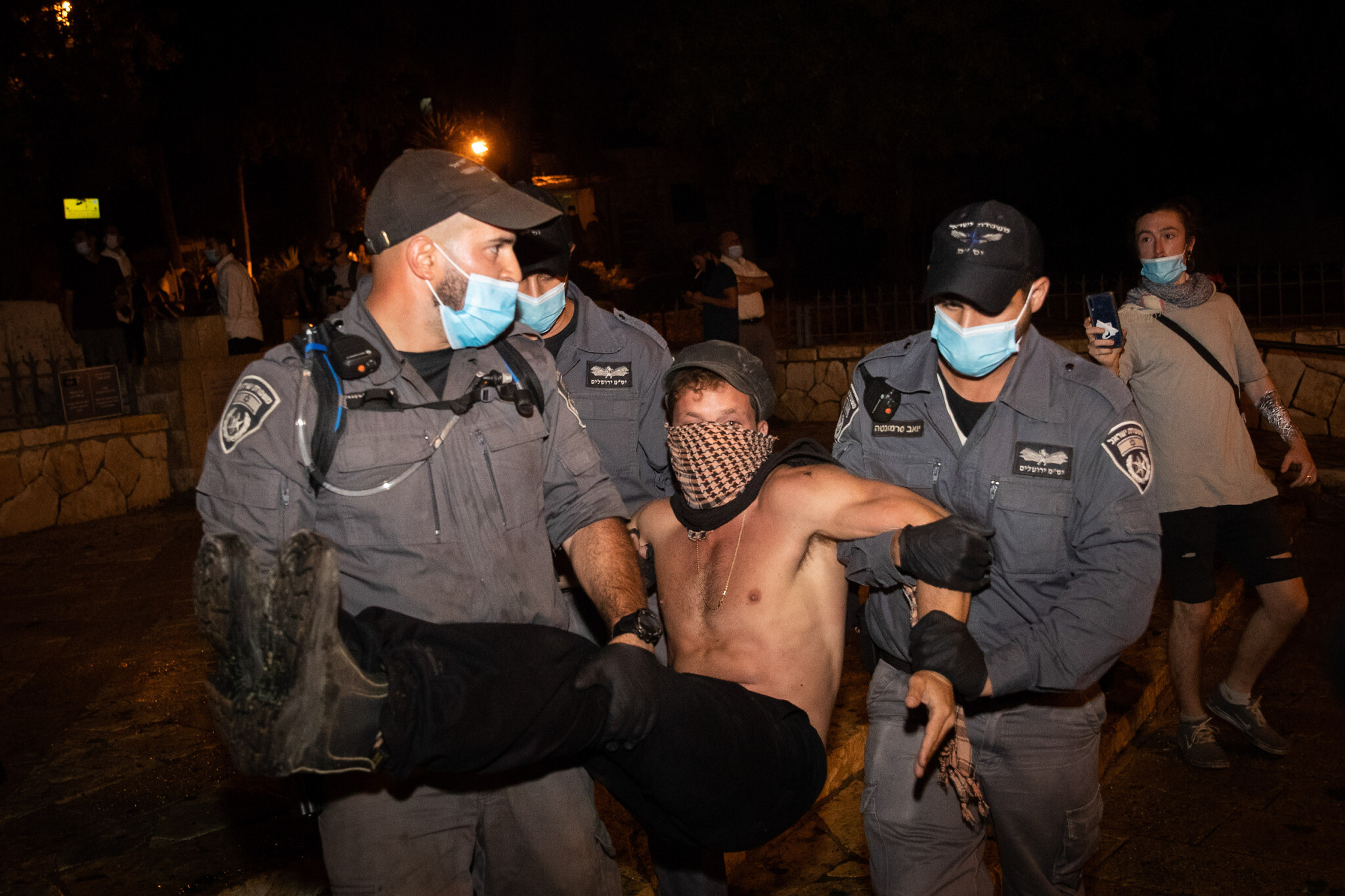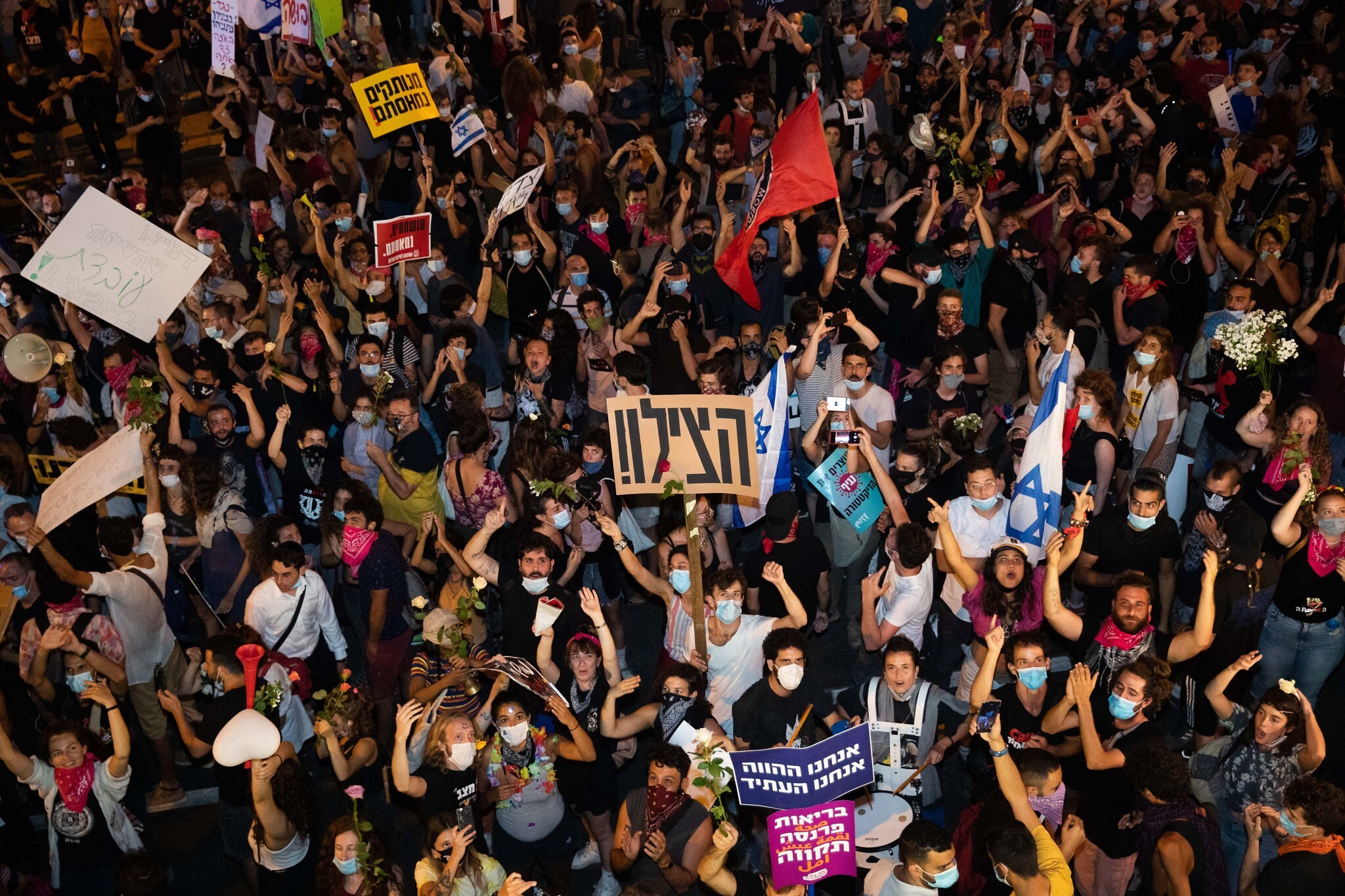Israeli police use water cannons to disperse anti-Netanyahu demonstrators
Protest near the prime minister's residence was initially largely peaceful but police said at least 55 people were later arrested

Israeli police have used water cannons to disperse protesters in central Jerusalem as clashes broke out overnight after thousands staged a demonstration against Prime Minister Benjamin Netanyahu.
Israelis have held a series of demonstrations in recent weeks calling on Mr Netanyahu to resign, citing his trial on corruption charges and his fractious unity government’s poor handling of the coronavirus pandemic.
The protest near the prime minister’s residence began around sundown on Thursday and was initially largely peaceful but police said at least 55 people were later arrested.
A smaller counter-protest in support of Mr Netanyahu was held nearby, with the two camps separated by metal barricades and a large police presence.
Police say they moved in to disperse the protesters when they tried to stage a procession through the city.
Officers scuffled with demonstrators before four large trucks roared into action, spraying water cannons and scattering the protesters.
At times, it appeared the trucks were spraying protesters from behind as they tried to leave the area peacefully.
Israel imposed a general lockdown when the first coronavirus cases appeared in March and by May had largely succeeded in containing the outbreak. But then it moved quickly to lift virtually all restrictions, and in the following weeks cases surged.

The country has reported a total of more than 57,000 cases and at least 442 deaths. More than 24,000 patients have recovered.
A unity government formed in May following three inconclusive elections in less than a year was supposed to prioritise the pandemic. Instead, it has been plagued by infighting and unable to agree on clear policies to combat the pandemic.
Mr Netanyahu meanwhile faces charges of bribery, fraud and breach of trust over a series of long-running corruption investigations.
Critics say he is more focused on escaping legal accountability than on containing the pandemic. Many have speculated he intends to call yet another election, allegations he dismissed as “absurd” in a Thursday press conference.
At the same conference, held as the protests were under way, he called on demonstrators not to clash with police, saying it would “lead to anarchy”.


Thank you for helping to make Jewish News the leading source of news and opinion for the UK Jewish community. Today we're asking for your invaluable help to continue putting our community first in everything we do.
For as little as £5 a month you can help sustain the vital work we do in celebrating and standing up for Jewish life in Britain.
Jewish News holds our community together and keeps us connected. Like a synagogue, it’s where people turn to feel part of something bigger. It also proudly shows the rest of Britain the vibrancy and rich culture of modern Jewish life.
You can make a quick and easy one-off or monthly contribution of £5, £10, £20 or any other sum you’re comfortable with.
100% of your donation will help us continue celebrating our community, in all its dynamic diversity...
Engaging
Being a community platform means so much more than producing a newspaper and website. One of our proudest roles is media partnering with our invaluable charities to amplify the outstanding work they do to help us all.
Celebrating
There’s no shortage of oys in the world but Jewish News takes every opportunity to celebrate the joys too, through projects like Night of Heroes, 40 Under 40 and other compelling countdowns that make the community kvell with pride.
Pioneering
In the first collaboration between media outlets from different faiths, Jewish News worked with British Muslim TV and Church Times to produce a list of young activists leading the way on interfaith understanding.
Campaigning
Royal Mail issued a stamp honouring Holocaust hero Sir Nicholas Winton after a Jewish News campaign attracted more than 100,000 backers. Jewish Newsalso produces special editions of the paper highlighting pressing issues including mental health and Holocaust remembrance.
Easy access
In an age when news is readily accessible, Jewish News provides high-quality content free online and offline, removing any financial barriers to connecting people.
Voice of our community to wider society
The Jewish News team regularly appears on TV, radio and on the pages of the national press to comment on stories about the Jewish community. Easy access to the paper on the streets of London also means Jewish News provides an invaluable window into the community for the country at large.
We hope you agree all this is worth preserving.





















